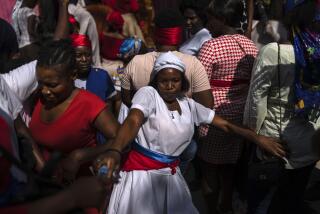Fatal Attractions: Experts See Link in How Some Cults Can Turn Killer
- Share via
The scenes of 48 dead in picturesque Swiss villages Wednesday bore striking resemblances to those on a Texas plain and in a steamy jungle in Guyana--previous sites of a fatal conjunction of religion, violence and communal living.
In 1978, 913 followers of the Rev. Jim Jones died in Jonestown, Guyana. Most appeared to have taken their own lives by ingesting grape drink laced with potassium cyanide. Others were shot. And last year in Waco, Tex., about 80 members of David Koresh’s Branch Davidians died in a hail of gunfire and a blaze that followed a standoff with federal authorities.
What can drive groups like these to such acts?
From Jonestown to Waco, and perhaps now to the Swiss towns, cult members appear to be drawn to a charismatic leader and to anticipate a cataclysmic upheaval or feel a threat from outsiders, according to experts interviewed Wednesday. The members see no life for themselves outside the group.
“I am always correcting the term ‘mass suicide,’ ” said Margaret Thaler Singer, a San Francisco clinical psychologist best known for her study of the 1978 Jonestown massacre. “. . . It’s done at the direction of a powerful leader who so controls information and information sources that he’s the only one talking to them and urging them on. Often, they’re at his mercy because there are armed guards.”
Most cults are peaceful. Indeed, some become respected in their communities and even major denominations. Methodists and Mormons, for example, were once considered cult groups.
But in a minority of cases, the mixture of doomsday thinking and a charismatic leader can be a mutual fatal attraction.
Singer said that cult leaders “bind” and gain control over followers by depicting the outside world as a threat. Koresh, for example, had predicted that his followers would all die by fire, and Jones had apparently convinced his followers to participate in what he called “revolutionary suicide” as the answer to outside threats.
Little is known about the Swiss group, known as the Cross and Rose, discovered Wednesday, and experts cautioned against drawing conclusions based upon the information initially available.
However, early accounts said that the Cross and Rose seemed to isolate itself. Residents of nearby villages said they had no idea the group was involved in cult behavior.
The group’s apparent founder, Luc Jouret--a practitioner of homeopathic medicine--fled to Switzerland in 1993 when authorities in Canada, where he lived, issued a nationwide arrest warrant for him after he was charged with weapons possession and conspiracy. It was unknown if Jouret was among the victims Wednesday.
It was also reported that both the Cross and Rose and another group Jouret founded in Canada, the Order of the Solar Temple, held apocalyptic views.
Religion experts said Wednesday that if the Canadian and Swiss groups held such views, their members would probably have other traits in common with the followers of Jones and Koresh.
Factors such as isolation can make members of cults particularly susceptible to group wishes, according to Robert Ellwood, a professor of religion at USC and author of several books on religion, including “Alternative Altars.”
“It’s like an implosion. They are pulled back from the world and get so much into their own ideology and own human relationships within the group that . . . they can’t think of themselves being a person with a life apart from the group,” Ellwood said.
When something happens that appears to threaten the existence of the group, Ellwood said, there comes a point when suicide seems the only way out.
“In a way, I don’t quite get it,” Ellwood added. “If it were a mass suicide, then you would say (a leader) had tremendous power. But if he and his henchmen just went out and shot them, that’s maybe mass murder but it doesn’t mean he had any mental power over them. He’s just the one that has the guns.”
Another expert joined Ellwood in pointing out that such traits as social isolation, constant focus on the group and an intense relationship with a leader do not necessarily lead to violence or death.
“Don’t be too quick to draw analogies,” said J. Gordon Melton, author of The Encyclopedia of American Religions and head of the Institute for the Study of American Religion in Santa Barbara.
Melton noted that there are hundreds of groups with such traits whose activities do not culminate in mass murder or suicide.
More to Read
Sign up for Essential California
The most important California stories and recommendations in your inbox every morning.
You may occasionally receive promotional content from the Los Angeles Times.













